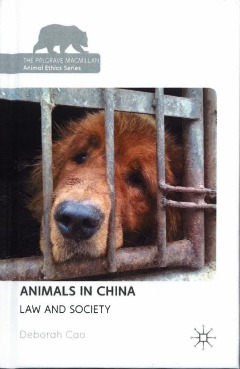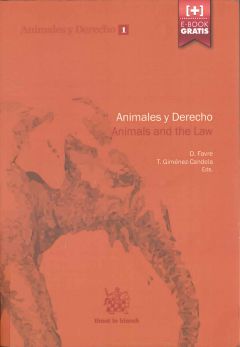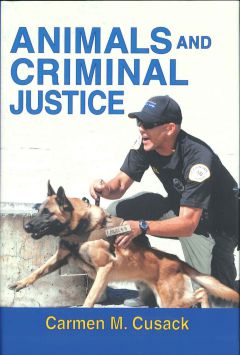Results
|
Title |
Author | Citation | Summary | Type |
|---|---|---|---|---|
| Animals in China Law and Society |
|
Policy | ||
| Animals as Vulnerable Subjects: Beyond Interest-Convergence, Hierarchy, and Property | Ani B. Satz | 16 Animal L. 65 (2009) |
This Article presents a new paradigm, premised on the equal protection principle, for the legal regulation of human interactions with domestic animals: Equal Protection of Animals (EPA). EPA combines the insights of vulnerability theorists with the equal protection principle and capability theory to create a mechanism for recognizing the equal claims of human and nonhuman animals to protections against suffering. Under such an approach, domestic animals—like humans—have claims to food, hydration, shelter, bodily integrity (including avoiding pain), companionship, and the ability to exercise and to engage in natural behaviors of movement. Existing animal welfare and anti-cruelty laws, despite their stated purposes, fail to protect animals adequately. This Article identifies the ontology of the problem as interest-convergence, famously described by Derrick Bell in the desegregation context. |
Article |
| Animals as Property | Gary L. Francione | 2 Animal L. I (1996) (html version) |
Animals are property, not persons. And yet, at the same time, they are treated differently than other forms of property such as cars, toasters, and crops. Professor Francione discusses the legal status of animals and argues that, given the law as it now stands, before any real gains can be made in animal rights, either theory or in practice, the legal classification of animals must change from that of good to something more closely resembling personhood. |
Article |
| Animals as Property | Gary L. Francione | 2 Animal L. i (1996) (pdf version) | This article gives a brief introduction of the social attitudes regarding animals as property. | Article |
| Animals as More Than 'Mere Things,' but Still Property: A Call for Continuing Evolution of the Animal Welfare Paradigm | Richard L. Cupp, Jr. | University of Cincinnati Law Review, Forthcoming; Pepperdine University Legal Studies Research Paper No. 19. Available at SSRN: http://ssrn.com/abstract=2788309 | Abstract: Survival of the animal welfare paradigm (as contrasted with a rights-based paradigm creating legal standing for at least some animals) depends on keeping pace with appropriate societal evolution favoring stronger protections for animals. Although evolution of animal welfare protection will take many forms, this Article specifically addresses models for evolving conceptualizations of animals’ property status within the context of animal welfare. For example, in 2015 France amended its Civil Code to change its description of companion animals and some other animals from movable property to “living beings gifted with sensitivity,” while maintaining their status as property. This Article will evaluate various possible approaches courts and legislatures might adopt to highlight the distinctiveness of animals’ property status as compared to inanimate property. Although risks are inherent, finding thoughtful ways to improve or elaborate on some of our courts’ and legislatures’ animals-as-property characterizations may encourage more appropriate protections where needed under the welfare paradigm, and may help blunt arguments that animals are “mere things” under the welfare paradigm. Animals capable of pain or distress are significantly different than ordinary personal property, and more vigorously emphasizing their distinctiveness as a subset of personal property would further both animal welfare and human interests. | Article |
| Animals and the Law |
|
Policy | ||
| Animals and Criminal Justice |
|
Policy | ||
| Animal-Related Laws Passed or Amended in 2009 | Rebecca F. Wisch | Animal Legal & Historical Center |
This article provides an overview of animal-related laws passed and/or amendment in 2009. |
Article |
| Animal-Related Laws Enacted or Amended in 2010 | Rebecca F. Wisch | Animal Legal & Historical Center |
This article provides an overview of animal-related laws passed and/or amendment in 2010. |
Article |
| Animal Wellness Action v. Soccer Wearhouse Inc | This complaint filed by plaintiffs Animal Wellness Action and the Center for a Humane Economy asks defendant Soccer Wearhouse Inc. to comply with existing California law. More specifically, it asks defendants to adhere to Penal Code section 653o (hereafter Section 653o), which prohibits the commercial importation, possession with intent to sell, and sale of products made with kangaroo parts. Through investigation and research, plaintiffs contend that defendants openly sell soccer cleats made of kangaroo leather, or “k-leather,” throughout California at defendants' various retail stores. According to plaintiffs, these stores make no attempt to hide the fact that these products contain kangaroo parts. Plaintiffs seek both a temporary restraining order and preliminary injunction, as well as a permanent injunction, enjoining defendant Soccer Wearhouse Inc. and its representatives, co-conspirators, and all persons acting in concert with defendant or on its behalf, from selling or offering for sale kangaroo leather shoes. | Pleading |


